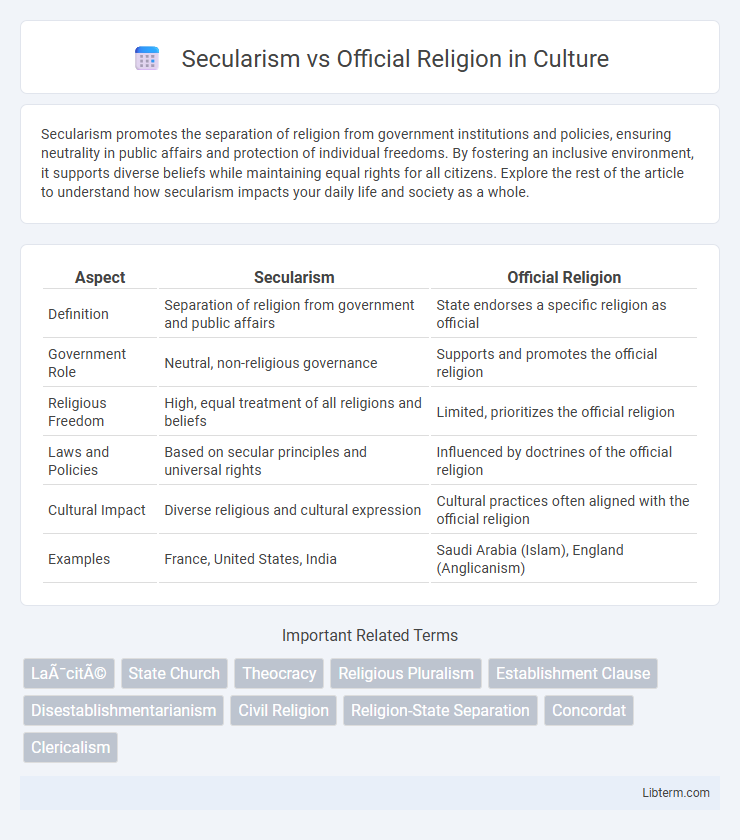Secularism promotes the separation of religion from government institutions and policies, ensuring neutrality in public affairs and protection of individual freedoms. By fostering an inclusive environment, it supports diverse beliefs while maintaining equal rights for all citizens. Explore the rest of the article to understand how secularism impacts your daily life and society as a whole.
Table of Comparison
| Aspect | Secularism | Official Religion |
|---|---|---|
| Definition | Separation of religion from government and public affairs | State endorses a specific religion as official |
| Government Role | Neutral, non-religious governance | Supports and promotes the official religion |
| Religious Freedom | High, equal treatment of all religions and beliefs | Limited, prioritizes the official religion |
| Laws and Policies | Based on secular principles and universal rights | Influenced by doctrines of the official religion |
| Cultural Impact | Diverse religious and cultural expression | Cultural practices often aligned with the official religion |
| Examples | France, United States, India | Saudi Arabia (Islam), England (Anglicanism) |
Understanding Secularism: Definition and Core Principles
Secularism is the principle of separating religion from state affairs, ensuring that government policies and institutions remain neutral regarding religious beliefs. Core principles include the protection of religious freedom, prevention of religious favoritism, and promotion of equal treatment for all citizens regardless of faith. This framework supports a pluralistic society where personal beliefs do not influence public governance or lawmaking.
What is an Official State Religion?
An official state religion is a faith formally endorsed and supported by a government, often influencing laws and public policies. This designation may grant the religion privileges such as state funding, control over religious education, or preferential treatment in legal matters. Countries with official state religions include Iran (Islam), England (Anglican Christianity), and Thailand (Theravada Buddhism), where religion intertwines with national identity and governance.
Historical Context: Secularism and State Religions Around the World
Historical context reveals that secularism emerged as a response to the dominance of official state religions, aiming to separate religious institutions from government authority. Key examples include the French Revolution's establishment of laicite and Turkey's Kemalist reforms, both designed to limit religious influence in politics. In contrast, countries like Saudi Arabia and Iran maintain official state religions that shape legal systems and governance, reflecting differing historical trajectories of religion-state relationships worldwide.
Legal Frameworks: How Constitutions Address Religion
Constitutions around the world adopt varied legal frameworks to address the relationship between state and religion, with secularism emphasizing the separation of religious institutions from governmental entities to ensure neutrality, while official religion models explicitly endorse a particular faith, often granting it preferential status and influence in law-making. Secular constitutions typically include provisions that guarantee freedom of religion and prohibit state establishment of religion, promoting equal treatment of all religious groups and safeguarding individual rights. In contrast, constitutions with official religions often integrate religious principles into legal codes and public policy, shaping national identity and governance within a religious context.
Social Impacts of Secular and Religious States
Secular states promote social cohesion by ensuring equal rights and freedoms regardless of religious affiliation, reducing sectarian conflicts and fostering inclusive public policies. In contrast, official religious states may face social division as laws and social norms prioritize one religion, potentially marginalizing minority groups and limiting pluralism. The social impact of secularism is often increased tolerance and diversity, while religious states can experience heightened social tensions and restricted civil liberties for dissenting populations.
Minority Rights: Protection and Challenges
Secularism ensures equal protection of minority rights by separating religion from state affairs, preventing religious bias in lawmaking and governance. Official religion policies often prioritize the majority faith, leading to systemic discrimination and limited rights for religious minorities. Challenges for minorities include restricted freedom of worship, unequal access to public services, and social exclusion in countries with state-endorsed religions.
Governance and Policy: Influence of Religion on Decision-Making
Secularism ensures governance and policy-making remain neutral by separating religion from state affairs, preventing religious doctrines from influencing laws and public decisions directly. Official religion systems integrate specific religious principles into governance, shaping policies to reflect particular faith-based values and moral codes. The balance between secular and religious governance impacts legislation on education, civil rights, and social norms, affecting inclusivity and pluralism in diverse societies.
Educational Systems: Secular vs Religious Curricula
Educational systems under secularism emphasize a curriculum grounded in scientific inquiry, critical thinking, and inclusive values, promoting neutrality in religious matters to foster diverse and open-minded student populations. Religious curricula, often present in official religion-based education systems, integrate faith-based teachings and doctrines alongside academic subjects, aiming to preserve cultural identity and moral frameworks aligned with specific religious beliefs. The divergence between secular and religious educational models significantly impacts student worldviews, social cohesion, and the balance between individual freedoms and communal traditions.
Case Studies: Comparisons of Secular and Theocratic Nations
Comparative analysis of secular and theocratic nations reveals distinct governance structures and societal impacts, with secular states like France emphasizing separation of religion and state to uphold pluralism, while theocratic regimes such as Iran integrate religious law into legislation, influencing civil rights and political authority. Case studies highlight how secularism promotes diversity and freedom of belief, contrasted with theocratic systems where religious doctrine often dictates legal and social norms. These differences shape national policies on education, human rights, and freedom of expression, underscoring the profound implications of secular versus official religious governance.
Current Debates: The Future of Secularism and State Religions
Current debates on secularism versus official religion emphasize the balance between religious freedom and state neutrality in diverse societies. Scholars analyze the impact of state-sponsored religions on minority rights and social cohesion, especially in countries like India, Egypt, and Saudi Arabia where official religions influence legislation. Emerging discussions focus on the adaptability of secular frameworks to accommodate religious pluralism without compromising democratic values and human rights.
Secularism Infographic

 libterm.com
libterm.com